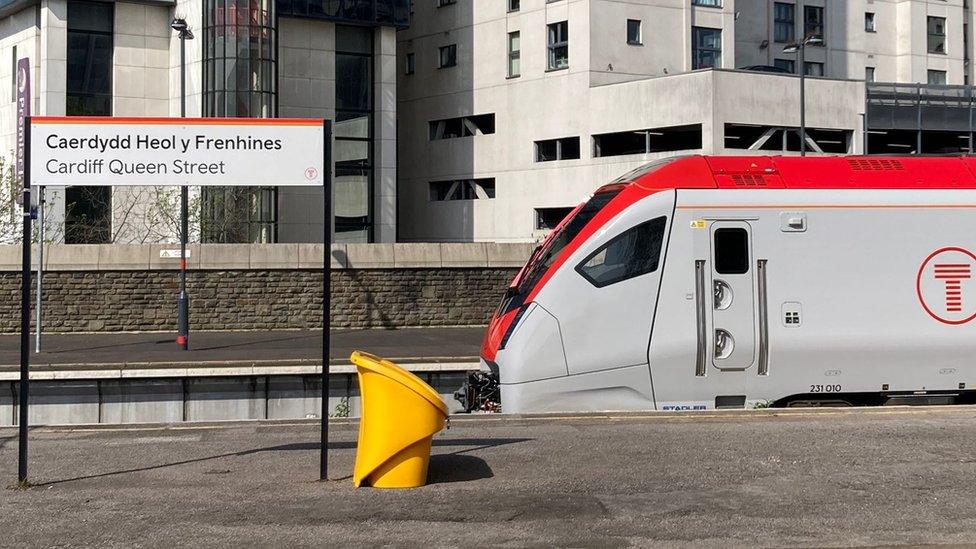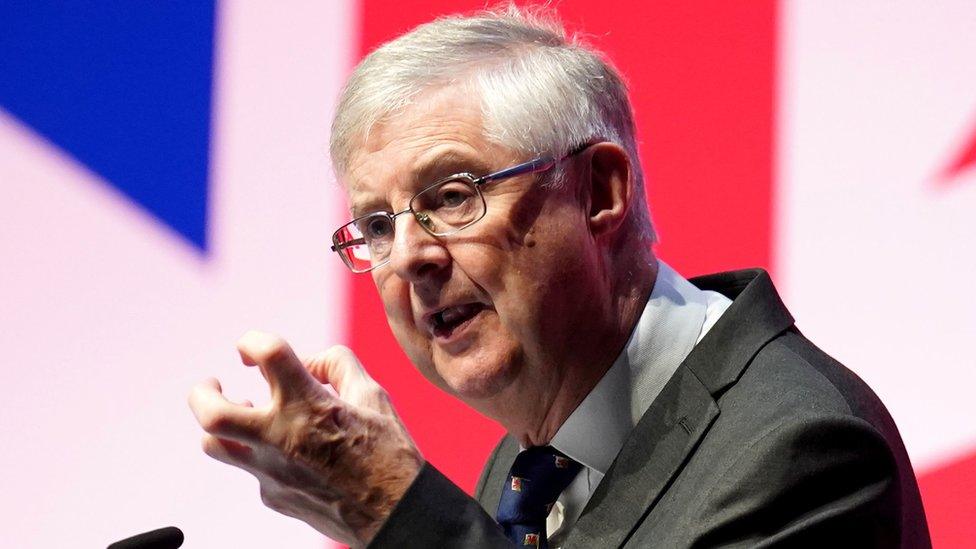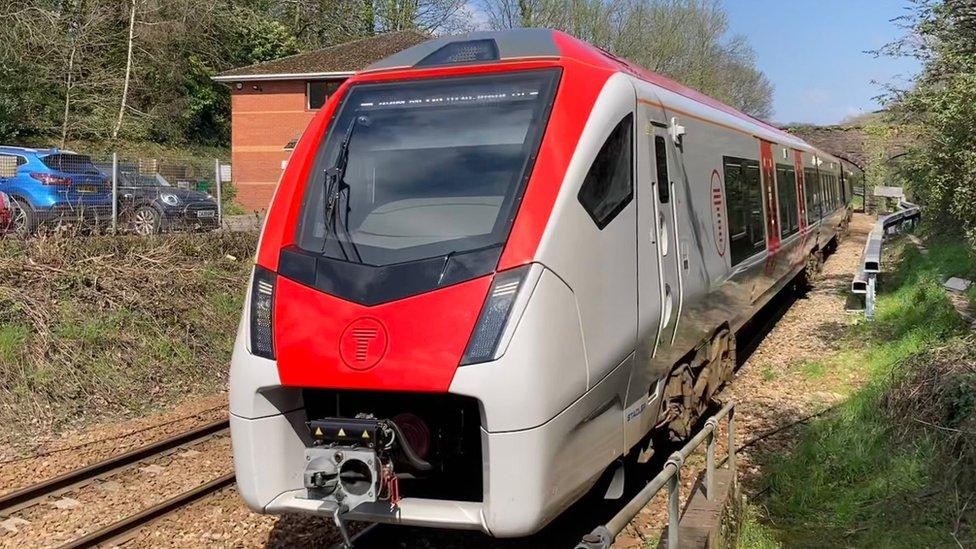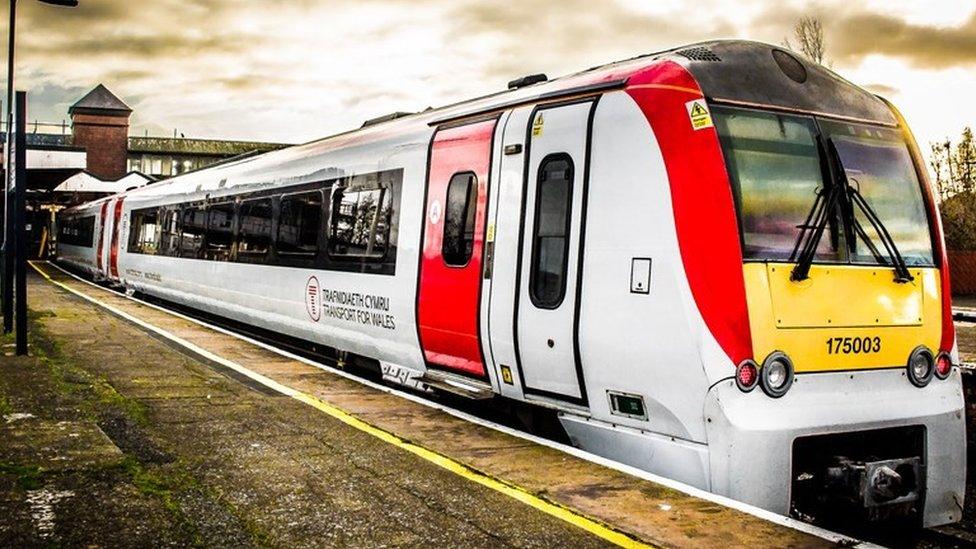Transport for Wales: No blank cheque for rail services - minister
- Published

Transport for Wales is owned by the Welsh government
Rail operator Transport for Wales (TfW) will not receive a "blank cheque" for future funding, Wales' economy minister has said.
Opposition parties have criticised a decision to award it £125m in extra Welsh government funding.
Vaughan Gething said the handout was an "informed choice" to avoid significant loss of TfW services and staff.
TfW boss James Price said it had faced a "very, very difficult situation" without the cash injection.
Why was TfW given more money?
Cuts have been made throughout the Welsh government's budget to move cash to the NHS and to keep trains running in response to budgetary pressures.
It led to cuts to the education and Welsh language department, rural affairs and social justice on Tuesday.
However there was extra money for health and transport, with TfW seeing an increase of more than 50% in its funding for 2023-24.
"We've made an informed choice about what we're going to do," Mr Gething told Sunday's BBC Politics Wales.
"We've maintained the local government funding settlement, we've invested more money to try to protect key NHS services and we've invested more money in Transport for Wales to make sure we can stay on track, to have the rail network that we want and we think the people of Wales deserve.
"It isn't a blank cheque."
Owned by the Welsh government, TfW has been responsible for train services across much of Wales since 2018.
Mr Price told the programme the extra money was to plug the gap between actual revenue from ticket sales - which has returned to pre-pandemic levels - and where TfW expected its revenue from ticket sales to be, according to projections set five years ago.
"It's not that we have seen a reduction in passenger numbers, what we haven't seen is the strong growth that was previously predicted through the pandemic period," he said.
"That means that we are roughly £100m short in farebox revenue compared to where we should be. That's a real challenge for us.
"We don't want to be in that position, and we certainly don't want to be taking money from other parts of the public sector, so we are working as fast as we possibly can to try and make up that lost ground."
Asked what would have happened to TfW without the extra funding, Mr Price said: "We would have been in a situation where we would have been closing routes down and actually having to reduce our headcount significantly because that's the only way we could continue operating".
"We wouldn't be trading in a situation where we couldn't balance the books, but it would have been a very, very difficult situation."
Will TfW be in the same position again next year?
Mr Price also suggested that TfW would need extra support again next year.
"If we look at the 2018 forecasts, I honestly believe that for the next few years, we will be struggling to catch up with where we ought to have been.
"The challenge that I have been very clearly set by the board and by the Welsh government is to close that gap as quickly as we possibly can.
"I think it's possible that we need additional support over and above what was in the assumptions in 2018-2019."
What about bus services?
In the meantime, organisations representing the bus industry have expressed disappointment that no extra funding was announced for bus services.
There have been warnings that up to a quarter of services could be cut when Covid recovery funding ends next March.
Aaron Hill, director of Confederation of Passenger Transport Cymru, said: "Ultimately what we see is - with 100 million bus passengers in Wales every year and 25 million rail passengers every year - there's a real inequity in the levels of funding and real disproportionate level of funding that goes into rail compared to bus.

Mark Drakeford told MPs on Wednesday that his government's subsidising of trains and buses was now at "an all-time high".
"We're not saying that rail doesn't need that funding, but we're in a position where 20-25% of bus services could be cut next year, and we still have no certainty over what that funding package looks like beyond that."
Andrew Potter, professor in transport and logistics at Cardiff University, said: "In the long run, I think there needs to be that decision as to how much subsidy we can put to rail versus the buses.
"At the minute the bus operators are very much operating on a sort of hand-to-mouth basis in terms of support from the government."
Responding to questions from MPs on the matter on Wednesday, First Minister Mark Drakeford said the public subsidy in buses and trains was "at an all-time high".
He added that investment in bus services had not been reduced as part of the "painful" exercise of finding savings.

THE CRASH DETECTIVES: Every serious incident on the road requires forensic examination
CROSSBOW KILLER: Investigating the case of a Welsh murder stranger than fiction

- Published18 October 2023

- Published31 December 2021
